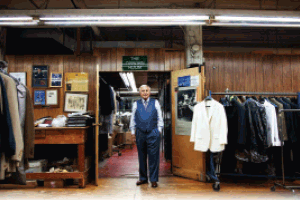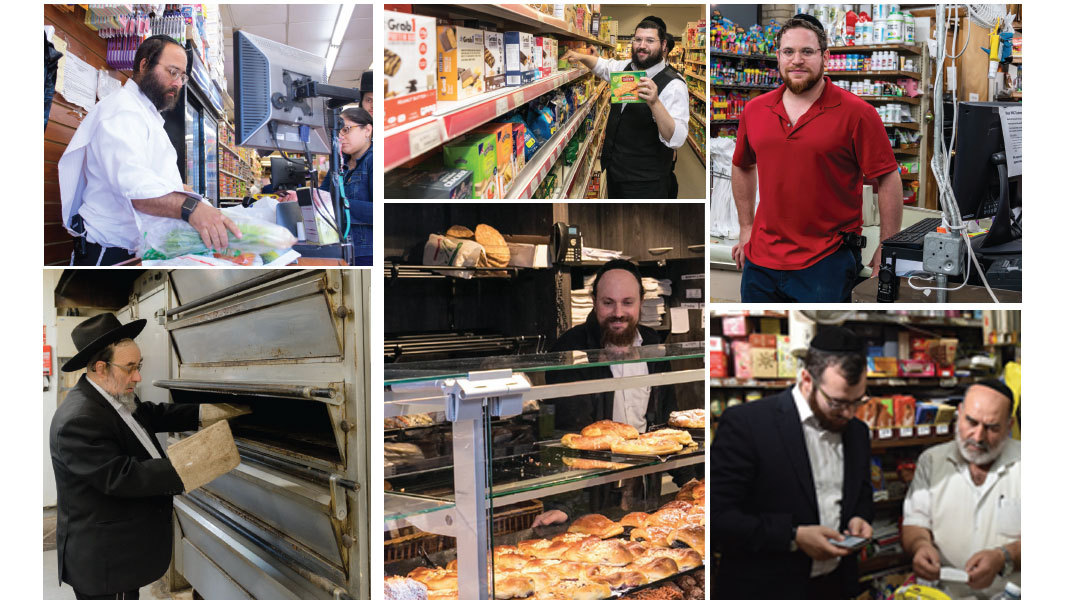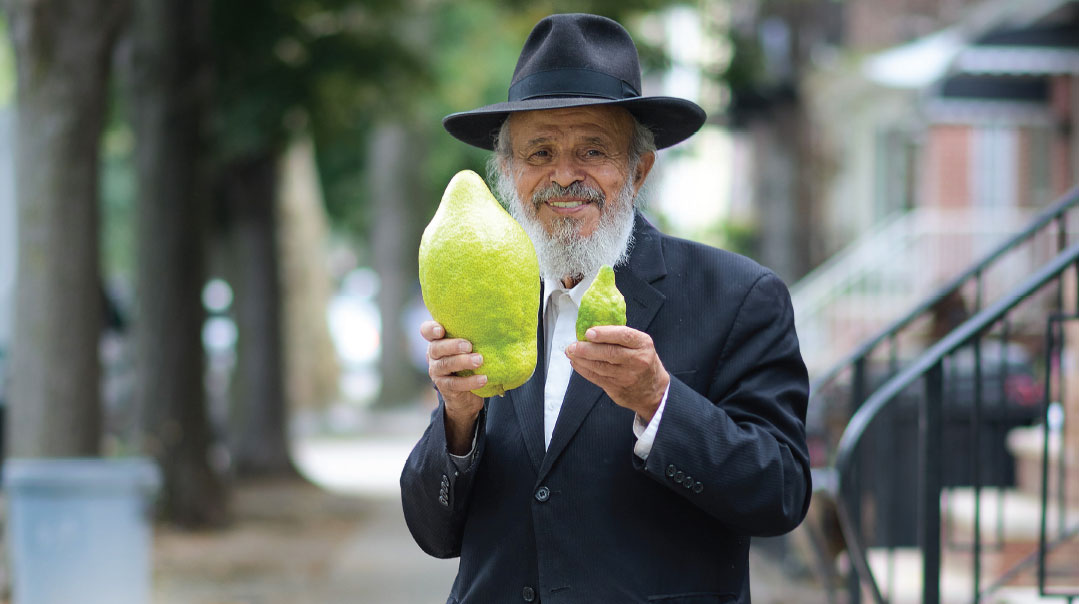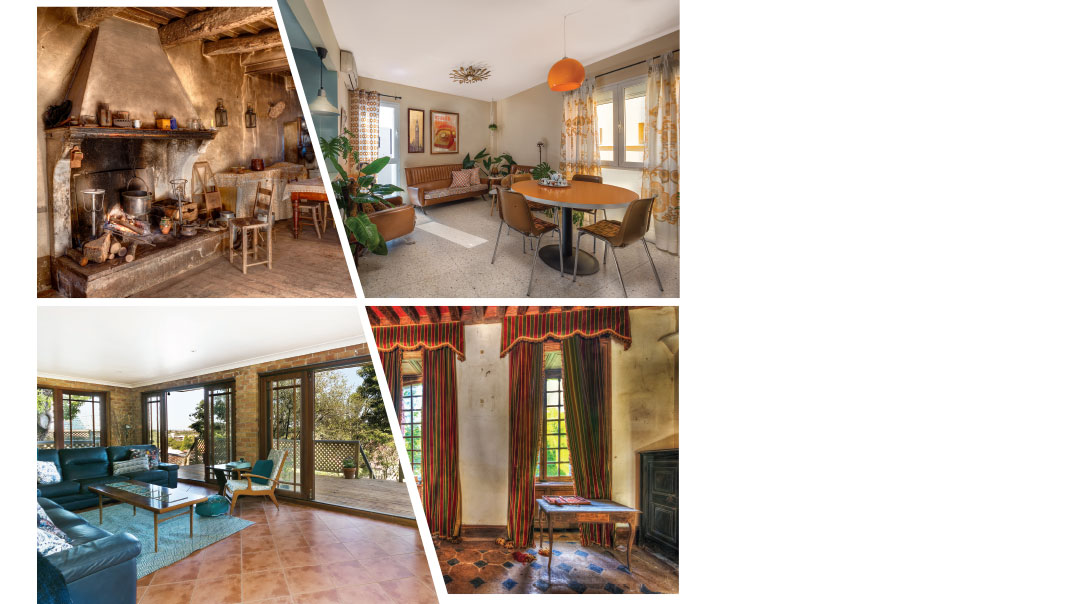Mendelsohn’s Secret Sauce

A Boro Park icon celebrates half a century of savory success
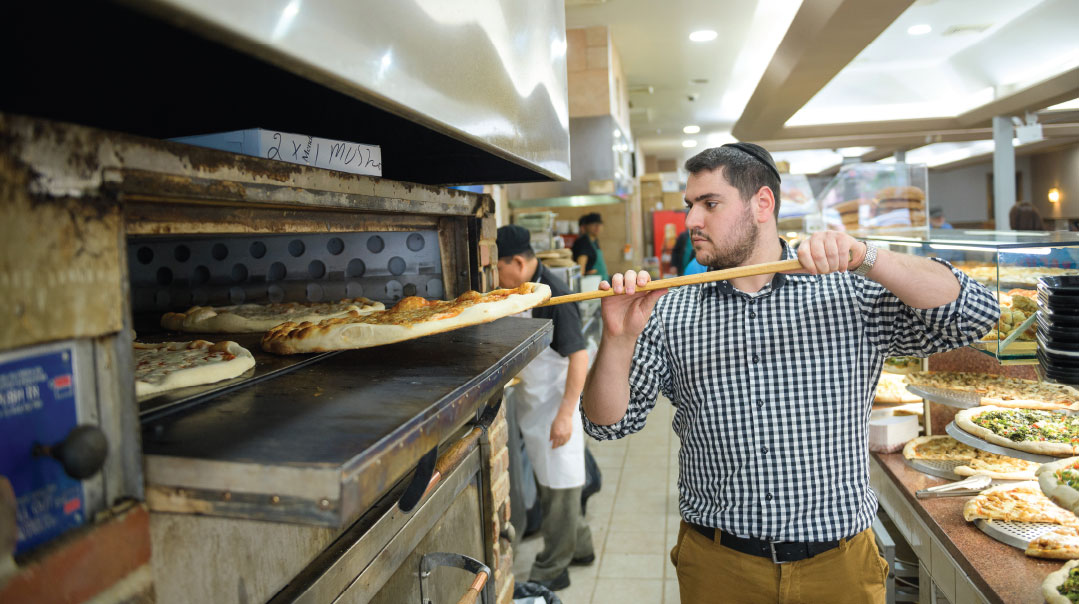
Photos: Naftoli Goldgrab
I
f a Jewish community is in some measure judged by the number of pizza shops it supports, Boro Park has its charter franchise right at its doorstep.
Fifty years ago, Rav Meir Mendelsohn, a posek, rav, rosh yeshivah, and mashgiach in several yeshivos, opened Mendelsohn’s Pizza and Dairy Restaurant on 18th Avenue, not far from the subway station. Two generations later, Mendelsohn’s is still at the same location, dishing out its unique recipes for pizza, ziti, and pita created a half century ago, seemingly unchanged by time and technology.
On a recent Motzaei Shabbos, about 15 people lined up waiting to order, despite the steady drizzle outside. There are those who come to order pizza and deliver it to their hungry families waiting at home, but on this night the tables and benches that seat nearly 200 were mostly full. It was hardly the scene envisioned by Rav Meir Mendelsohn and his wife when they began catering to Boro Park’s residents decades ago, seeking to fill a gap in a growing Jewish community.
“When my grandfather passed away and my father [Kalman] took over,” says Heshy Mendelsohn, who runs the enterprise today along with his brothers, Motty and Meir, “he said that his mission was not to ruin things and to keep the tradition alive. The eineklach’s mission is the same thing. Yes, we create new concepts and all that, but the core things that were here before — the ziti sauce, the pizza sauce, the pizza dough, the pita — is all made fresh, using the same secret recipes.”
Rav Meir, a Holocaust survivor and a Gerrer chassid with chassidus pulsating through his bones, arrived in the United States in 1956 with his wife Malka to attend his son Kalman’s chasunah. After the wedding, he and his wife decided to stay. He accepted a job as a rosh yeshivah in Klausenburg and as a mashgiach in Bobov, and she worked as a cook in local schools.
Eventually, says their grandson Heshy, burdened with debt, they realized that they needed a steadier income, so Rav Meir began asking locals what kind of business the neighborhood needed.
“My grandfather, the batlan that he was, asked the bochurim at his yeshivah which food was popular,” says Heshy, eating soup at a corner table as we speak. “They told him that bochurim like pizza, so he opened up a pizza shop. He had no clue about anything related to baking pizza.”
There was a non-kosher bakery on 18th Avenue near McDonald Avenue that was up for sale. Rav Meir’s brother-in-law, Meir Frankel, purchased the building, and soon thereafter the pizza store was in business. The doors opened in 1969, a few days before Rosh Hashana, with just three offerings: pizza, falafel, and french fries. In keeping with what people of the time expected from a pizzeria, the shop was more of a takeout place with little more than an oven, and a small dining area in the back room.
Rav Meir was the one who would sit behind the counter, his nose inches away from his sefer (except when a customer walked in the shop), while his wife created the recipes that still draw huge crowds today. They were not the first pizza shop in the area — Amnon’s had been there for a decade already, though not in its current location — and the Mendelsohns felt they had to be unique to succeed.
Rav Meir’s wife sampled the sauces that were then popular with pizza shops and set out to make something different and memorable.
“There’s nobody in the world with a sauce that is sweet and spicy and garlicky,” Heshy says. “My grandmother was the baker, my grandfather sat behind the counter. It was the ultimate family-run place.”
Today, Mendelsohn’s is much more than a small pizza shop. There is a spacious eating area decorated with modern décor, the brick ovens creating a savory smell that hovers over the eatery. The dough and sauce created 50 years ago — which, Heshy tells me, remain “trade secrets” — are still in use, along with the special pita dough and pasta.
Around the time Mendelsohn’s first opened its doors, the first chalav Yisrael soft ice cream was invented. One of Mrs. Mendelsohn’s trade secrets was an icy milchig dessert made from custard, the forerunner of soft ice cream.
But disaster struck in 1997, when a fire destroyed the building. The blaze took with it the entire operation, including the handwritten recipes created over three decades by the family matriarch. Most of the recipes had backups at home, but the one for soft ice cream was lost forever.
“Everything else we were able to save or recreate,” Heshy says. “The pizza recipe was backed up. But for the ice cream, the children just didn’t know how it was done. It’s truly a shame.”
There is no great science to how the pizza and sauce are made, though the family keeps the recipe in a safe in one of the Mendelsohn brothers’ homes. Even the pizza makers don’t know the exact ingredients of the round, crisp pies. The store employs about a dozen people who have been with the business for more than a decade, a consistency the Mendelsohns say is part of their success. One employee has been there for 30 years and several others for nearly two decades.
“My brothers and I make the pizza dough ourselves and come and put in the final ingredient,” Heshy explains. “Being in the business a long time, we know that this is one thing everyone wants to copy. There’s a certain nostalgia to it, and people are not going to get that anywhere else.”
That nostalgia is real for more than a few customers. Many singles have their breakfast there every day, and newly married couples are treated to a free lunch during their sheva brachos week. This promotion started in the 1980s, when Kalman Mendelsohn’s wife began it as a zechus for a friend who was not well. One customer has been coming in once or twice a week for over 30 years. “We make the ziti how he likes it,” Heshy says, smiling.
Not all of Mendelsohn’s creations worked out as planned. According to a relative, one reason Rav Meir wanted to open a pizza shop was that he was dismayed at seeing people reciting a mezonos blessing on pita bread that was clearly hamotzi. But his research into various doughs that would unquestionably require the hamotzi blessing did not work out as planned. Mendelsohn’s dough today contains 60 percent fruit juice, giving it the texture of sponge cake.
One special ingredient that the store possessed was integrity. Rabbanim and others trusted Rav Meir’s kashrus implicitly, and locals and famous people trusted his wife’s baking products. The Ponevezher Rav, Rav Yosef Shlomo Kahaneman, who would frequently visit New York and stay in a house two blocks away from Mendelsohn’s, was a frequent customer.
“They trusted my grandfather,” Heshy says. “We’ve also had many famous people come in. Ehud Olmert was here when he was mayor of Jerusalem. I once saw in an interview from Yerachmiel Begun of the Miami Boys Choir that a favorite memory of his as a child was that after practice he would go to Mendelsohn’s. But we never make a big deal when a celebrity walks in. I know you want a good pizza, not to be disturbed.”
In 1975, Rav Meir’s son Kalman joined the business, and the menu expanded to dozens of items. Fifteen years later, Kalman’s children began working in the family business, adding frozen pizza and enlarging the menu to over 100 offerings.
Pizza is by far the most commonly ordered item at the restaurant. Coming in a distant second is lasagna baked in a distinctive Italian sauce. The busiest times for the restaurant are the week before Pesach — when harried housewives indulge their chometz-deprived families — and the week before Tishah B’Av, when fleishig is not an option.
The day they sell the most pizzas is Motzaei Pesach. How many pies are sold then? “We don’t count,” Heshy says.
While the recipes and standards have remained consistent over the years, other parts of the store have definitely changed. Fifty years ago, customers came in for a slice of pizza. Today, they are seeking an ambience, a dining experience. Couples want some relaxing downtime, others want a quiet atmosphere for a business meeting or a heimishe place to get together with family or friends.
“We definitely are staying ahead of what’s going on in the kosher restaurant industry — everyone is going high-end, artisan,” Heshy observes. “We believe we make the pizza the best it can be and there’s nothing to change. We’re trying to stay on top of the trend while at the same time keeping the mission alive.”
“Fifty years ago, there was no concept of creating a dining experience,” Heshy continues. “It was just come, eat, and go. Today, there’s a whole package you have to give. Besides having food and drink you have to provide a certain experience, otherwise it’s not going to work.”
The challenge is to embrace the ambience while staying true to the core “mission,” as Heshy repeatedly refers to it throughout our conversation. “If we start serving on china, parents are not going to come with little kids,” he says.
“There are a lot of amazing restaurants,” he continues. “I respect every one of them, as long as their food is consistent. That’s the concept — that the food has to be the same. To me, the best comment from a customer is, ‘it’s the same as it used to be.’ People just want the taste of their youth.”
The Rosh Yeshivah’s Pizza Shop
Rav Meir Mendelsohn’s legacy may have been the delicious pies trayed out from the oven but his background was far removed from pizza sauce and the vagaries of falafel toppings.
“Only America takes Reb Meir and puts him in a pizza store,” the Klausenburger rebbe, Rav Yekusiel Yehuda Halberstam, quipped. Rav Meir had asked him for a brachah when he opened his store but, unaware of the connotation pizza had, did not inform the Rebbe which shop he was opening.
Rav Meir was born in prewar Warsaw, a city known as an ir v’eim b’Yisrael, and rapidly gained renown as an illui. At the age of 12 he was encouraged to apply to the new Yeshiva Chachmei Lublin, the mother of the modern yeshivah established by Rav Meir Shapiro.
Gaining acceptance into the yeshivah was limited to the best and brightest of central Europe. At a minimum, bochurim had to know 200 dapim Gemara by heart, in addition to a plethora of additional conditions.
“Which masechtos do you know?” questioned the famed gaon and progenitor of the daf yomi program.
“Seder Nashim and Nezikin,” responded the young lad.
“Beautiful. Which one did you prepare for the farher?”
“Maseches Taanis,” Meir Mendelsohn replied.
Rav Meir Shapiro then embarked on a four-hour-long farher, then issued him an acceptance letter. Still before his bar mitzvah, Rav Meir did not begin his studies in Chachmei Lublin for another few years, after the passing of Rav Shapiro. But the memories of his encounter never left him, and he rarely missed a single day of daf yomi, even during his wartime wanderings in the forests of Ukraine when he would deliver a shiur to his friends by heart.
By the age of 18, Rav Mayer wrote a sefer on Shas that bore a warm haskamah from the Sadigurer rebbe, the Avir Yaakov. That year, he became one of only two bochurim that would receive semichah from Rav Menachem Ziemba, a gaon living in Warsaw universally recognized as one of the city’s leading lights.
Rav Meir survived the onset of the Second World War, arriving in Eretz Yisrael in 1940 and settling in Bnei Brak. He developed a close relationship with the Chazon Ish and eventually became a maggid shiur in his famed Kollel Chazon Ish. The family has a letter written by the Steipler, Rav Yaakov Yisrael Kanievsky, requesting of “my friend, the gaon,” to edit his seforim, Kehillas Yaakov.
Moving to the United States in the 1950s, he became rosh yeshivah of the Klausenburger Rebbe’s fledgling yeshivah, becoming mashgiach in Bobov at the same time.
When he opened his pizza shop, he even had a steady chavrusa coming each day to learn with him. The chavrusa, Chacham Yosef Harari-Raful, was later the founder of Yeshiva Ateret Torah in Flatbush that is credited with revolutionizing the city’s Sephardic community. Gedolim would come in to talk with him in learning. And boys of the area knew that if they knew their Gemara well, they could get a free ice cream at Mendelsohn’s.
Rav Meir started his pizza store as a means to pay off his debts. The day he burned his final IOU, in 1979, he called his family together and declared his immediate retirement. He moved back to Eretz Yisrael and was invited by the yishuv in Ramat Polin to serve as rav. He was niftar a decade later, in 1990.
“When he was in the store my grandmother would say, ‘Meir, you’ll learn later, put away the Gemara, I need your help,’ ” Heshy says. “He was always learning. He opened a pizza shop to pay his debts, but he was always seen as a rav and posek, even by customers.”
(Originally featured in Mishpacha, Issue 783)
Oops! We could not locate your form.







